
Ernst Alfred Cassirer was a German philosopher. Trained within the Neo-Kantian Marburg School, he initially followed his mentor Hermann Cohen in attempting to supply an idealistic philosophy of science.

Jean André Wahl was a French philosopher.
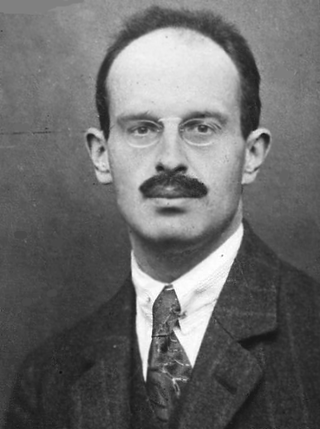
Oskar Halecki was a Polish historian, social and Catholic activist. Doctor Honoris Causa of the Polish University Abroad (1973).
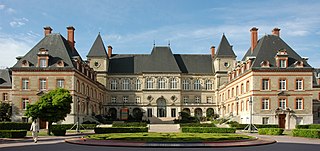
Cité internationale universitaire de Paris or the Cité universitaire is a university campus, a private park and foundation located in Paris, France. Since 1925, it has provided general and public services, including the maintenance of several dozen residences housing around 6,000 students and visiting academics in the Île-de-France region. Officially recognized as a foundation of public interest, the CIUP promotes exchanges between students from around the world in a spirit of tolerance.

Albert Thibaudet was a French essayist and literary critic. A former student of Henri Bergson, he was a professor of Jean Rousset. He taught at the University of Geneva, and was the co-founder of the Geneva School of literary criticism. He was succeeded in his post by Marcel Raymond.

The International Committee on Intellectual Cooperation, sometimes League of Nations Committee on Intellectual Cooperation, was an advisory organisation for the League of Nations which aimed to promote international exchange between scientists, researchers, teachers, artists and intellectuals. Established in 1922, it counted such figures as Henri Bergson, Albert Einstein, Sarvepalli Radhakrishnan, Jagadish Chandra Bose, Nitobe Inazo, Marie Curie, Gonzague de Reynold, Leonardo Torres Quevedo, and Robert A. Millikan among its members. The committee was the predecessor to UNESCO, and all of its properties were transferred to that organisation in 1946.
Peter Eli Gordon is an American historian of philosophy, a critical theorist, and intellectual historian. The Amabel B. James Professor of History and Faculty Affiliate in the Department of Philosophy at Harvard University, Gordon focuses on continental philosophy and modern German and French thought, with particular emphasis on the German philosophers Theodor Adorno and Martin Heidegger, critical theory, continental philosophy during the interwar crisis, and most recently, secularization and social thought in the 20th century.
Gonzague de Reynold was a Swiss writer, historian, and right-wing political activist. Over the course of his six-decade career, he wrote more than thirty books outlining his traditionalist Catholic and Swiss nationalist worldview.
Otmar Seul was born on August 30, 1943, in Trier (Germany) and held lectures at the Paris Ouest-Nanterre-La Défense from October 1989 to September 2011 as a Professor of legal German. In cooperation with his German counterpart Werner Merle, he founded the renowned integrated curriculum of French and German law in 1994–1995, joining together the University of Paris Ouest-Nanterre-La Défense (France) and the University of Potsdam (Germany). This curriculum became the centre of a European network of academic cooperation in legal sciences that is open to new forms of studies and research internationalisation. Otmar Seul's most innovative idea was the creation in 2004 of French-German summer universities with other European and non-European countries. His research on industrial democracy and employee participation in companies reflects this French-German and European intercultural dimension.
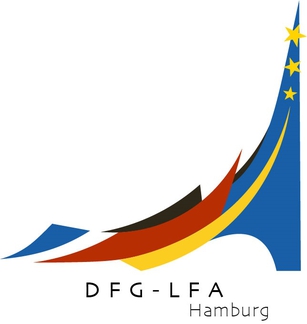
The Deutsch-Französisches Gymnasium Hamburg(DFG) or Lycée Franco-Allemand Hambourg (LFA) is a public, French-German school in Hamburg, Germany. It is directly operated by the Agency for French Education Abroad (AEFE), an agency of the French government, and is a part of its network.

There are five French-German secondary schools known in German as Deutsch-Französisches Gymnasium (DFG) and in French as lycée franco-allemand (LFA). Mixing students, teachers and teaching methods of both countries, DFG/LFAs are highly selective schools of excellence. Their teachers are paid by the French and German states, and tuition is free of charge.
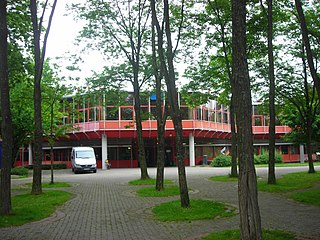
The DFG / LFA Freiburg is a DFG/LFA, a public French-German secondary school in Freiburg im Breisgau, Germany. It offers free education from grades 5 through 12.
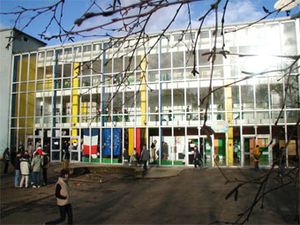
DFG / LFA Buc is a German-French international lycée/gymnasium located in Buc, Yvelines, France, in the Paris metropolitan area.

The Cassirer–Heidegger debate was a 1929 encounter between Ernst Cassirer and Martin Heidegger in Davos during the Second Davos Hochschulkurs.

Jeanne Bouvier is remembered as a French textile worker, feminist, and militant trade unionist.

Carole Grandjean is a French politician of La République En Marche! (LREM) who has been serving as Minister for Education and Vocational Training in the government of Prime Minister Élisabeth Borne since 2022. From the 2017 elections to 2022, she was a member of the French National Assembly, representing the department of Meurthe-et-Moselle.

The Franco-German University is an international organisation of universities from Germany and France with the purpose of facilitating international cooperation in higher education. The FGU is not a university in its own right, but rather enables students to study at multiple universities in both countries in a Franco-German course of study, leading to a double degree.

The Aachen Treaty, formally Treaty on Franco-German Cooperation and Integration, and also known as the Treaty of Aachen, is a bilateral agreement between Germany and France, which entered into force on 22 January 2020, a year after it was signed. It was signed by Federal Chancellor Angela Merkel and President Emmanuel Macron in the coronation hall of the Aachen City Hall on 22 January 2019.
The France–Germany football rivalry is one of the biggest and most heated association football rivalries in Europe, between two European sides, France and Germany, two of the most successful national teams in the world. Previously, it was mostly a one-sided phenomenon since most German fans considered the Netherlands or Italy to be their traditional footballing rivals until the rise of France from the 1990s onward, but the rivalry really began during the UEFA European Championships in the 2010s decade after a series of mere friendlies in the 1990s to 2000s.

Ulrich Pfeil is a German historian based in France.



















